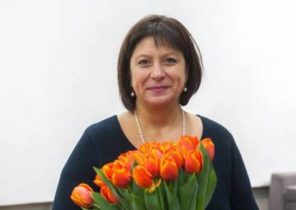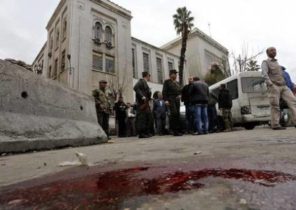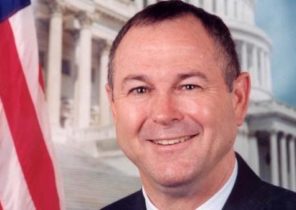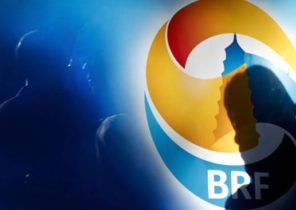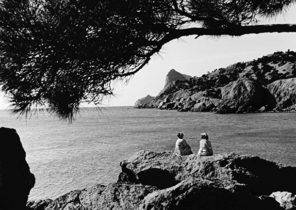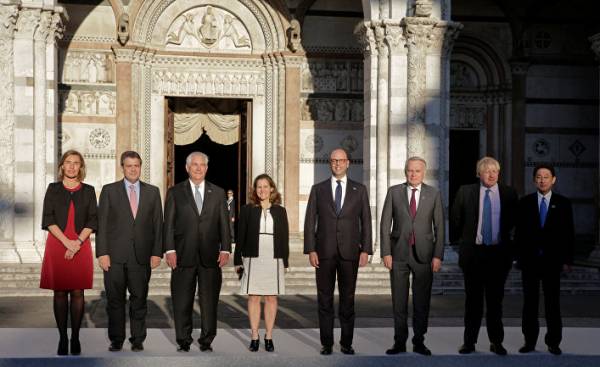
Nothing suggests that the foreign Ministers of the seven major Western industrialized countries at least for a moment allowed to distract yourself in the beauty of the Tuscan town of Lucca. It was not only about the deterioration of the situation in the Syrian civil war, not only on joint positions in relation to the Middle East and North Korea, said one Italian diplomat in an interview with this newspaper. And not only these topics were “extremely complex and difficult”. On the diplomatic parquet changed the language: “a Populist tone sound louder.” The diplomat did not wish to name the person he had in mind. But on Tuesday at the end of the two-day meeting of foreign Ministers of Italy, Canada, France, Germany, Japan, the United States and Britain (G7) it was clear that it was about the British foreign Minister, Boris Johnson (Boris Johnson). Because he was the only one who threatened “targeted sanctions,” the Russian head of state Vladimir Putin, an ally of the Syrian dictator Bashar al-Assad (Baschar al Assad). In the Ducal Palace in Lucca, Johnson campaigned for measures “that would really hurt Putin’s pain”. However, on this occasion, “for a minute” there was no consensus, said host foreign Minister of Italy Angelino Alfano (Angelino Alfano).
Furthermore, the preparatory meeting for the summit of heads of government in may in Sicily ended with the demand Putin to go back to dialogue with the West. So in a 30-page communiqué reads: “In all of our interests to see Russia returned to the international security rules and again became a partner.” Even if this future is not excluded restrictions as “political tools”, yet in many areas there are joint interests, as for example in the fight against terrorism, the issue of migrants, or in matters of environmental protection. Therefore, “we are keen to include Russia and to find ways to work together to confront common challenges”. However, from the point of view of the G7, there is one condition: Putin should not support Syria’s Assad. “The reign of Assad is coming to an end,” said us Secretary of state Rex Tillerson (Rex Tillerson) in Lucca. Now Russia has to make a choice between the United States and those countries that think, like Assad, like the regime in Iran or ally of Tehran and the Lebanese militia Hezbollah. With these words, Tillerson said goodbye and left for Moscow, where he can specify not only the common position of the “Big seven”. It is also supported by the foreign Ministers of Turkey, Jordan, Saudi Arabia, the United Arab Emirates and Qatar. These opponents of Assad, Italian foreign Minister early on Tuesday morning called in the “Palazzo Ducale” to an hour-long meeting on the complex situation in the civil war in Syria. Is Saudi Arabia still wants to send troops into the country torn apart by numerous groups, as a few weeks ago, said the Minister of foreign Affairs is not yet known. It is possible that it this strongly urged, moreover, that could break new conflict the Saudis with Iran. Not to create the impression of a rude attitude to Iran, an important ally of Assad, Alfano in the preparation of the G7 meeting even was on the phone with Iranian foreign Minister Mohammad Javad Zarif (Mohammad Javad Zarif). With all the support of Assad, announced after that Alfano members of the “Big seven”, Iran also considers the use of chemical weapons is unacceptable and will in the UN to insist that it was checked the use of poison gas last week in Idlib.
Even if Lucca became clear the Central role of regional powers from Turkey to Iran, the “Big seven” is still preferred that first and foremost it has “potential” to solve the Syrian conflict and to build a United Syria, as stated in the final statement: “We call on Russia to exert influence on the real and genuine political process in Syria.” From the point of view of the G7, Russia would be, in fact, easier to support more than Assad. There was “something absolutely terrible”, said French foreign Minister Jean-Marc Ayrault (Jean-Marc Ayrault): the use of chemical weapons by the regime. Therefore, Moscow will be said: “Take this opportunity to dissociate itself from the terror of Bashar al-Assad.” Foreign Minister of Germany Sigmar Gabriel (Sigmar Gabriel) stated: “it is Impossible to stand on the side of the regime, which is not the first time uses poison gas against his own population.” Gabriel campaigned for a speedy meeting of all foreign Ministers of the International Syrian support group, to which belong so far Assad’s allies Russia and Iran.
In addition, the G7 is the strongest also condemned North Korean nuclear tests and missile tests. “Dramatic growth” in the number of these tests starting in 2016, violates international agreements and increasingly threatens regional security, said in a closing statement. The “big seven” it requires North Korea to abandon further trials, to destroy existing nuclear weapons and to curtail all programs for the development of such weapons. In addition, Italy has been able to gain G7 support for the international community recognized government in Libya, and the conflict between Israel and the Palestinians the only way out of this crisis, first recognized the solution “two States”.
